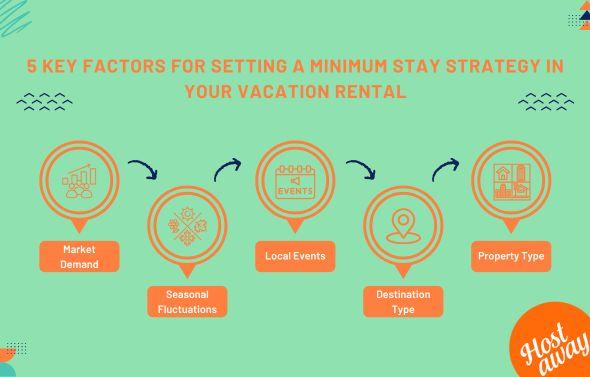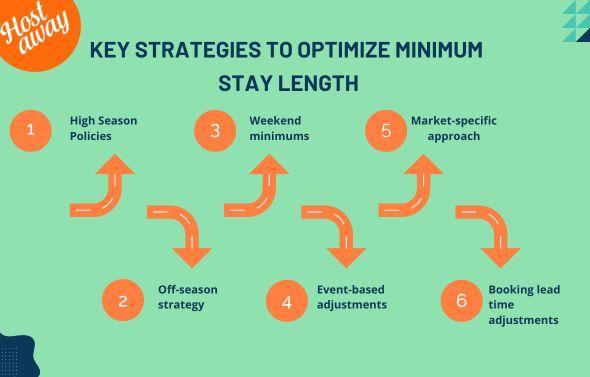Airbnb Minimum Stay: Everything You Need to Know

Your minimum stay policy is an important factor in maximizing your vacation rental revenue.
Many hosts lose out on potential income because of the substantial disconnect between their minimum stay policies and what is profitable.
It is also key in property management and can help deter bad guests like those looking to book a single night to throw a party. In fact, Airbnb itself enforces minimum stay requirements around special days like New Year's Eve to prevent parties.
What is a Minimum Stay?
A minimum stay, minimum night stay or minimum length of stay requirement is the minimum number of nights you require a guest to book.
How to Design the Optimal Minimum Stay Strategy for Your Vacation Rental
There is no one-size-fits-all rule for your Airbnb minimum stay settings.
Some hosts opt for a one-night flexible minimum stay policy. Others insist on week- or even month-long stays to attract only long-term guests. Many set a two- or three-night policy and forget about it.
The most profitable way is to be proactively dynamic. First, factor in considerations such as:
Market demand
Seasonal fluctuations
Local events
Destination type
Property type
Then, utilize any number of the strategies below for optimal effect.

High season policy
During peak seasons, especially those associated with special events like Christmas, setting longer minimum stays helps you capitalize on high demand and reduces the risk of revenue loss from one-night stays and unbooked gap days.
This strategy ensures you maximize revenue during high demand periods.
Off-season strategy
In low-demand periods, adjusting your listing calendar Airbnb minimum stay policy to allow shorter minimum stays, even going as far as one-night minimum stays where feasible, can help your listing attract guests
This helps you maintain a steady stream of bookings and revenue during slower months.
Weekend minimums
Weekends are like the 'high season' of any given week.
Avoid losing potential revenue by restricting single-night weekend bookings, which may leave your property underutilized. Create custom rules and set minimum stays to two- or three-nights for weekends to increase occupancy and optimize your earnings.
Event-based adjustments
Big ticket events — like festivals, sports games or conferences — create spikes in demand. Lengthening your minimum stay policy during these times can help you capture higher-value bookings and avoid one-nighters. For example, AirDNA data reveals that during Austin’s 10-day South by Southwest event in 2023, properties with three-night minimums earned the most revenue, followed closely by those with four- to six-night minimums.
Market-specific approach
Not all markets behave the same. Highly seasonal markets experience major swings in demand, requiring flexible stay strategies tailored to peak and off-peak periods.
Conversely, non-seasonal markets with consistent demand may benefit from a steadier approach. Adjust your booking settings dynamically to suit your hosting style guest preferences, specific target market and property type.
Booking lead time adjustments
Consider adjusting the minimum stay settings your booking settings based on how far out the booking is.
For reservations made well in advance, increase the minimum stay to secure more profitable, longer-term bookings. As the date approaches, lowering the minimum stay can help fill last-minute availability.
Use your past data, hosting strategy, market trends and common sense to determine the best minimum length of stay for each period that your Airbnb property is made available for bookings. Don't forget to consider local regulations that can mandate a specific minimum stay requirement.

Additional Considerations for Optimizing Your Airbnb Minimum Night Stay Policy
Cleaning fees
Cleaning fees are only charged once per booking and cleaning costs should be factored in.
Consider that if you charge a fee of $100 for cleaning a five-night booking, it is still less than a cleaning fee of $30 each for five bookings of one-night stays. If you clean your property yourself and include this as part of your income, longer stays will see you earn less overall.
Competition with hotels
If your property is based in a destination where competition with hotels is high, shorter stays attracting guests will help you stay competitive. But this increases your risk of unauthorized parties.
Gap nights
Longer minimum night stays can lead to gap nights.
For example, if you set a five-night minimum stay and have three days of availability between two stays five nights long, the gap of three days won't show on Airbnb as available to be booked. Adjust your policies to fill the gaps and optimize occupancy.
Traveler type
Airbnb short-term rentals in urban destinations attract business travelers on weekdays. They tend to book later and expect shorter minimum night requirements.
Meanwhile vacationers tend to book longer stays and do so earlier. Adapt your policy to cater to the traveler segments that frequent your property.
How to Set Your Minimum Number of Nights on Airbnb
To set minimum night booking requirements on your Airbnb listing:
Go to Your listings and select your listing
Click Manage listing
Click Availability
Next to Trip length click Edit
Enter minimum night requirements
To create custom rules for each day of the week, click Customize by day of the week.
To set minimum nights for a specific date or season, click Add a custom rule for seasons or specific dates.
If you have multiple minimum night requirements that apply to the same day, the more specific requirement will be used.
Let's say you have a minimum 1-night requirement for all reservations, but you have a minimum 3-night requirement for reservations on the weekend. If a guest requests a Friday reservation, they'll be required to stay three nights and not just one night.
Mastering Airbnb Minimum Night Policies for Success
Optimizing your Airbnb minimum night stay policy isn't just about setting a number. It's about strategically adapting to market dynamics, season demands and the specific properties of your Airbnb.
By considering factors such as revenue optimization and guest management and analyzing market trends and competition, you can craft a policy that optimizes occupancy and income for your Airbnb business.